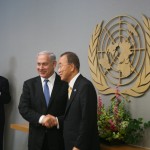 Representatives from Israel and the Palestinians are set to meet with Mideast Quartet envoys to talk peace talks next week, but the discussions will be held separately from each other and with no clear timeline for the renewal of direct negotiations. United States spokesman Mark Toner, in comments published by the US State Department, said on Monday that the sides will meet with the Quartet in Jerusalem on October 26.
Representatives from Israel and the Palestinians are set to meet with Mideast Quartet envoys to talk peace talks next week, but the discussions will be held separately from each other and with no clear timeline for the renewal of direct negotiations. United States spokesman Mark Toner, in comments published by the US State Department, said on Monday that the sides will meet with the Quartet in Jerusalem on October 26.
The Quartet—consisting of the US, the European Union, the United Nations and Russia—called on September 23 for a preparatory meeting to set the framework for a new round of negotiations within a month. Toner was quoted as saying the idea behind the October 26 meeting is to “work to begin preparations and develop an agenda for proceeding in negotiations.”
This meeting misses the original Quartet deadline by a few days, although Toner felt the separate meetings still were within the spirit of those plans. “The idea of the timetable was to set dates and identifiable objectives to move them towards a path towards direct negotiations,” Toner told reporters.
“We feel that this meeting, on this date, fulfills the letter of that intent and that it is moving them towards those direct negotiations. That is our ultimate goal.”
Israeli Prime Minister’s spokesman Mark Regev confirmed in an interview with The Mideast Update that Israel will participate in the meetings. However, this is still working towards real negotiations, not the official beginning of them. When asked if this marked the actual resumption of talks, Regev said, “I don’t think we’re quite there yet.” He also expressed Israel’s disappointment that the Palestinians have yet to agree to direct negotiations with Israel.
“We think that is a mistake that the Palestinian leadership is making,” said Regev by phone. “The Quartet has called for the resumption of peace talks without preconditions. We are ready, and we think it’s a mistake the Palestinians are making that they continue to boycott peace talks. We’re not going to move this process forward by not talking.”
Regev said they are “ready for the immediate resumption of direct talks” and that “the ball is clearly in their [the Palestinians’] court.” However, when asked if they’ve received any indication that the Palestinians might be open to talking directly, he said there’s “not any good news to report yet.”
The Palestinians have repeatedly mentioned preconditions to renewing peace talks, with halting Israeli settlement construction an often-mentioned demand. Israel did enact a 10-month partial settlement construction freeze in an unprecedented move in 2009-10. However, the Palestinians refused to upgrade indirect talks in 2010 to direct meetings until the freeze was almost over. They then suspended talks after Israel chose not to renew the moratorium.
Another commonly mentioned precondition is that Israel accept the 1967 lines as the basis for negotiations on borders, which would grant the Palestinians the entire West Bank and Gaza Strip, presumably with the option of agreed upon land swaps.
Regev reiterated Prime Minister Benjamin Netanyahu’s willingness as expressed in his UN speech last month to accept a framework on borders Regev described as “difficult for Israel,” if the Palestinians accept a formula on accepting Israel as a Jewish state with rights for minorities.
Said Netanyahu at the time regarding US proposals to restart talks, “There were things in those ideas about borders that I didn’t like. There were things there about the Jewish state that I’m sure the Palestinians didn’t like. But with all my reservations, I was willing to move forward on these American ideas.”
In addition to the preparatory meeting, the Quartet plan to return to negotiations as outlined on September 23 also called for the sides to present “comprehensive proposals” on territory and security within three months. At this point it remains unclear when or if that will happen or in what format.
Israel has repeatedly called for direct peace talks with the Palestinians since the last substantial negotiations were ended almost three years ago—a period that includes the entirety of Netanyahu’s current term as Prime Minister. Since those talks were ended the sides have only had the one brief stint of direct talks in 2010.
“Israel wants to see the earliest possible return to peace talks,” said Regev. “And we think the international community today should be telling the Palestinian Authority that their continued boycott of the negotiating table—that policy is unsustainable and should be changed as soon as possible.”
Toner did feel they were “on a path towards direct negotiations” and “making progress,” but he also noted the hard road ahead.
“If you want me to say that this is easy, it’s not. We all know that we’ve been at this for a few years here, if not more and longer,” said Toner of the peace process. “We continue to believe that this is in our national security interest, it’s in the interest of our allies and partners in the region, and we’re going to continue to work towards it.”
(By Joshua Spurlock, www.themideastupdate.com, October 19, 2011)
